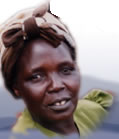THEMES IN THIS
TESTIMONY
Family Life

Gender

Health

Social Change

Click on arrows
to find more
testimonies
featuring
these themes
|
|
Sex
|
Female
|
|
|
Age
|
47
|
|
|
Identity
|
Sabaot
|
|
|
Occupation
|
Farmer/housewife/widow
|
|
|
Location
|
n/a
|
|
|
Date
|
November 1996
|
|
summary
This is an interesting story of a woman who has had to cope independently at various stages in her life. Ann Sile’s experience of looking after her siblings after her mother died, thus missing out on an education, and as a widow, raising and educating her children without any outside support, demonstrates what is possible for a woman even when material resources and popular attitudes are against her. And indeed, times have been hard for the narrator, but despite this she has succeeded in educating all her children, something she seems to have been particularly keen to achieve.
Although this a short interview with a slow start, the last few pages are unquestionably the most valuable part, when the narrator’s feelings and beliefs are most clearly articulated, and she gives advice to other widows on how to cope in an often hostile environment. When considering the reasons why women often think that they cannot be independent, she says “maybe because they are used to staying with their husbands. She might even be having property but she does not know how to take care of that property. I have seen many women who have been cheated. Someone comes in claiming that he can help her but ends up eating everything and offering her no help. He will say, sell this cow so that we can do this. After they sell the cow, he eats the money and it is the children who end up suffering...that is why I am telling them to take care of their wealth.” At the end of the interview Ann Sile reminds other women: “Your husband is also supposed to depend on you. You are the head of the family.”
detailed breakdown
|
You will need a password from Panos to view the full
transcript of the interview. To apply for a password, click here.
Once you have a password, click here to go to the beginning
of the transcript. You can also click on any section of the
breakdown of content below and go straight to the
corresponding part of the transcript.
|
| Section 1-2 |
Narrator couldn’t go to school because she had to look after her brothers and sisters when her mother died.
Married life: working as a farmer, housewife and raising the children while her husband worked as a teacher.
|
| Section 3 |
Attitudes of her and her husband towards family planning: her husband was in favour of using family planning because he was educated.
Her husband’s sudden death, and the problems she has had to raise and educate her children alone: “I educated my children through farming.”
|
| Section 4 |
Working as a farmer and selling her produce to pay for her children’s upbringing and fees. Didn’t need to use fertiliser on the land.
How her religion has helped her through: “There are difficulties because doing work for two people is hard. However putting God before everything makes it easier.” How her brothers-in-law pestered her because she was sole head of her family, but the village headman told them to leave her alone.
|
| Section 5 |
How some of her neighbours helped her with the farming. Sold her oxen in order to pay for her children’s education, and how all her children who have completed school are now employed.
|
| Section 6-7 |
Describes how although life without a husband is difficult she has discovered that it is not impossible, but feels she learned a lot when her mother died because she was the eldest girl and had to look after her siblings.
How she learned from her neighbours how to plant food.
|
| Section 7 |
Describes how she coped with her youngest siblings immediately after her mother’s death.
|
| Section 7-9 |
Her message to other widows: “...let them not just sit idle because their husbands are dead.” How people’s attitudes are changing towards women being independent: before when a man died, his brothers were supposed to support his family, but the narrator believes this was useless because the brother(s) would just exploit the widow and children: “He would come, eat everything and then go away after finishing.” She believes that there is a need for men to teach their wives how to cope on their own in case they die. How widows should be strong and think of the children. Considers what makes women believe that they cannot be independent. People’s attitude to her predicament: “There are some who say that you have done well. There are others who say that you persevered and other who say you rule with arrogance and that you rule your home...there are those who will abuse you. They will say that women these days are arrogant. All you have to do is to persevere and go ahead with your work. But nowadays, I can see respect creeping in. They say “How are you, mum?” after seeing what you have done is not insignificant.”
|
|


